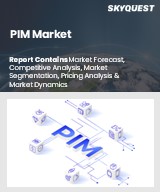
Report ID: SQMIG45F2202
Skyquest Technology's expert advisors have carried out comprehensive global market analysis on the pim market, covering regional industry trends and market insights. Our team of analysts have conducted in-depth primary and secondary research to provide regional industry analysis and forecast of pim market across North America, South America, Europe, Asia, the Middle East, and Africa.
North America leads in market share for worldwide PIM because of digital maturity, total presence of e-commerce, and ubiquitous presence of leading PIM players. It is being driven by strong IT infrastructure, end-customer requirements for innovative omnichannel experience, and increasing product data compliance concern. Organizations are adopting cloud-based PIM solutions to achieve efficiencies and deliver speed in go-to-market efforts, particularly in the retail, manufacturing, and consumer electronics sectors.
United States leads the North American PIM market because of its advanced retail ecosystem and massive investments in digitalization. IBM, Oracle, and Informatica are integrating AI-based solutions into their products. Salsify introduced an AI-driven content management module in February 2024 to allow U.S.-based retailers to boost personalization to drive conversions on channels like Amazon and Walmart.
Canada is observing mounting uptake of PIM among mid-market companies with growth in electronic commerce on the rise. Focus on regulations to bilingual packaging and accurate labeling allows for hassle-free convenience in PIM development. Toronto digital innovation firm Pivotree partnered with Pimcore in March 2024 to offer customized PIM and MDM solutions to homegrown retailers that need catalog control and speed-to-market maximization.
The Asia Pacific region is the globe's fastest-growing PIM market region because there is rapid growth in e-commerce, rising penetration of smartphones, and digitalization of current retail infrastructure. Emerging economies are implementing cloud-based PIM solutions to centrally manage product data to serve multilingual and multicultural customers' requirements. Spur in direct-to-consumer companies and government efforts for the digital economy across countries like India, Japan, and South Korea are also leading to adoption. Also, players on a global level are reaching out to a wider regional presence in order to take advantage of the fast-moving consumer goods (FMCG), apparel, and electronics segments.
Japan's manufacturing and retail industries are leveraging PIM solutions to optimize product data in supply chains. Proper nature and completeness are also take-up drivers. In October 2023, Sony, the Japanese consumer electronics company, partnered with Contentserv to roll out a bespoke PIM solution to reduce foreign market product launches.
South Korea's competitive e-commerce environment and well-established tech infrastructure fuel PIM needs, particularly in electronics and beauty. Lotte, a Korean department store, introduced a localized AI-powered PIM solution in December 2023 that automates updates to channel content to enhance customer experience and ensure data consistency across omnichannel touchpoints.
Europe is sustained to maintain leadership in the global PIM industry, thanks to strict product data law and increasing e-commerce. Demand for PIM system excellence is fueled by the need for GDPR compliance, content localization, and harmonized digital product passports across nations.
Germany's automotive and industrial sectors are high on the list of PIM adopters due to local language needs as well as deep product hierarchies. In January 2024, Bosch, the German electronics firm, implemented a cloud-based PIM system to improve real-time product updates for B2B sites and geographically localized marketplaces.
France is experiencing PIM take-up in the fashion, retail, and food sectors. Regulatory requirements and traceability requirements for enriched product content lead the way. French luxury group LVMH reasserted its partnership with Akeneo last February 2024 to automate global catalog distribution further fueling the brand's localization and data quality initiatives.
Active UK online and retail trade markets are some of the biggest users of PIM solutions, especially post-Brexit, as localization and regulatory compliance of product data were top priorities. In March 2024, Tesco, the UK supermarket retailer, launched a centralized system of PIM with sustainability measurement to address customer demands for open product origins.
REQUEST FOR SAMPLE
Global PIM Market size was valued at USD 12.3 billion in 2023 and is poised to grow from USD 14.53 billion in 2024 to USD 54.97 billion by 2032, growing at a CAGR of 18.1% during the forecast period (2025-2032).
Market leaders are concentrating on automation, decision-making based on facts, and platform-based innovation in order to compete in the PIM space. Main strategies include the integration of AI and machine learning for enrichment of data, content syndication, and tailored customer support. Cloud-native solutions are the priority based on scalability as well as quick go-live capability. Mergers and acquisitions, and strategic partnerships are also increasing with organizations seeking global long-term coverage and vertical-specialized capacity. 'Oracle (USA)', 'SAP (Germany)', 'IBM (USA)', 'Informatica (USA)', 'Pimcore (Austria)', 'Akeneo (France)', 'inriver (Sweden)', 'Winshuttle (USA)', 'Riversand (USA)', 'Salsify (USA)', 'Aprimo (USA)', 'Stibo Systems (Denmark)', 'Contentserv (Switzerland)', 'Mobius (India)', 'Perfion (Denmark)', 'Profisee (USA)', 'Censhare (Germany)', 'Vinculum (India)', 'Pimworks (USA)', 'TrueCommerce (USA)'
Increasing consumer knowledge of where products are originating, and also safety and sustainability concerns, have created enormous growth in demand for accurate, concise, and richer product information. Organizations are adopting PIM solutions to deliver an enhanced customer experience with richer product attributes such as certification, use instructions, composition, and environmental information. Food and personal care clean-labeling, for example, necessitates that brands utilize PIM solutions with safe and regulatory-approved content on store shelves and on webstores.
Short-Term: AI and automation implementation are transforming product data management within businesses. AI-powered PIM solutions are now the ones that are auto-generating the product content, validating them for errors, and customizing in real-time. These solutions not only reduce the touch of human intervention but also improve the accuracy and consistency of product listings across multiple digital channels—absolutely vital in online business and omnichannel retailing.
Why is North America Leading PIM Market in 2024?
Want to customize this report? This report can be personalized according to your needs. Our analysts and industry experts will work directly with you to understand your requirements and provide you with customized data in a short amount of time. We offer $1000 worth of FREE customization at the time of purchase.
Feedback From Our Clients